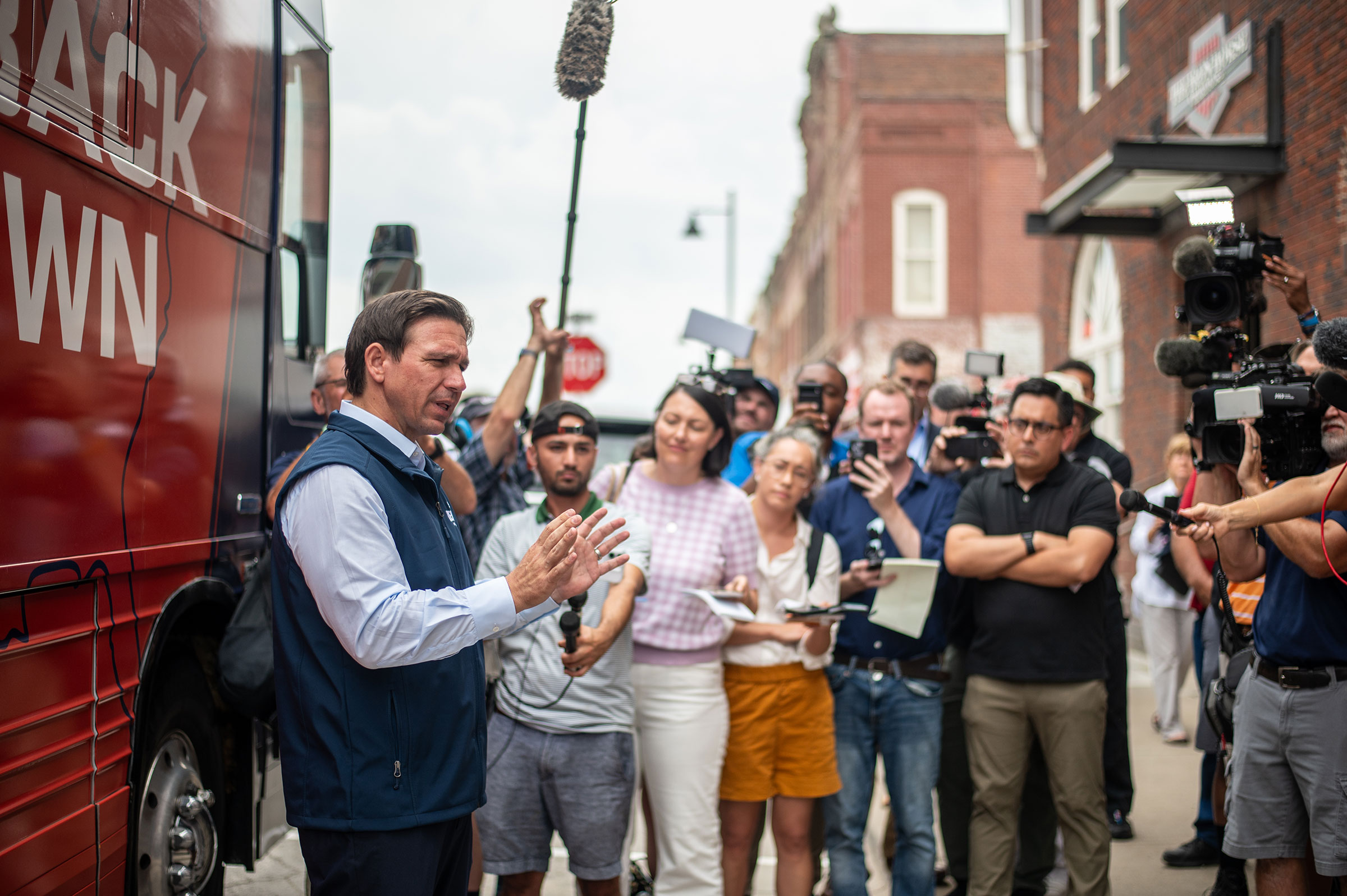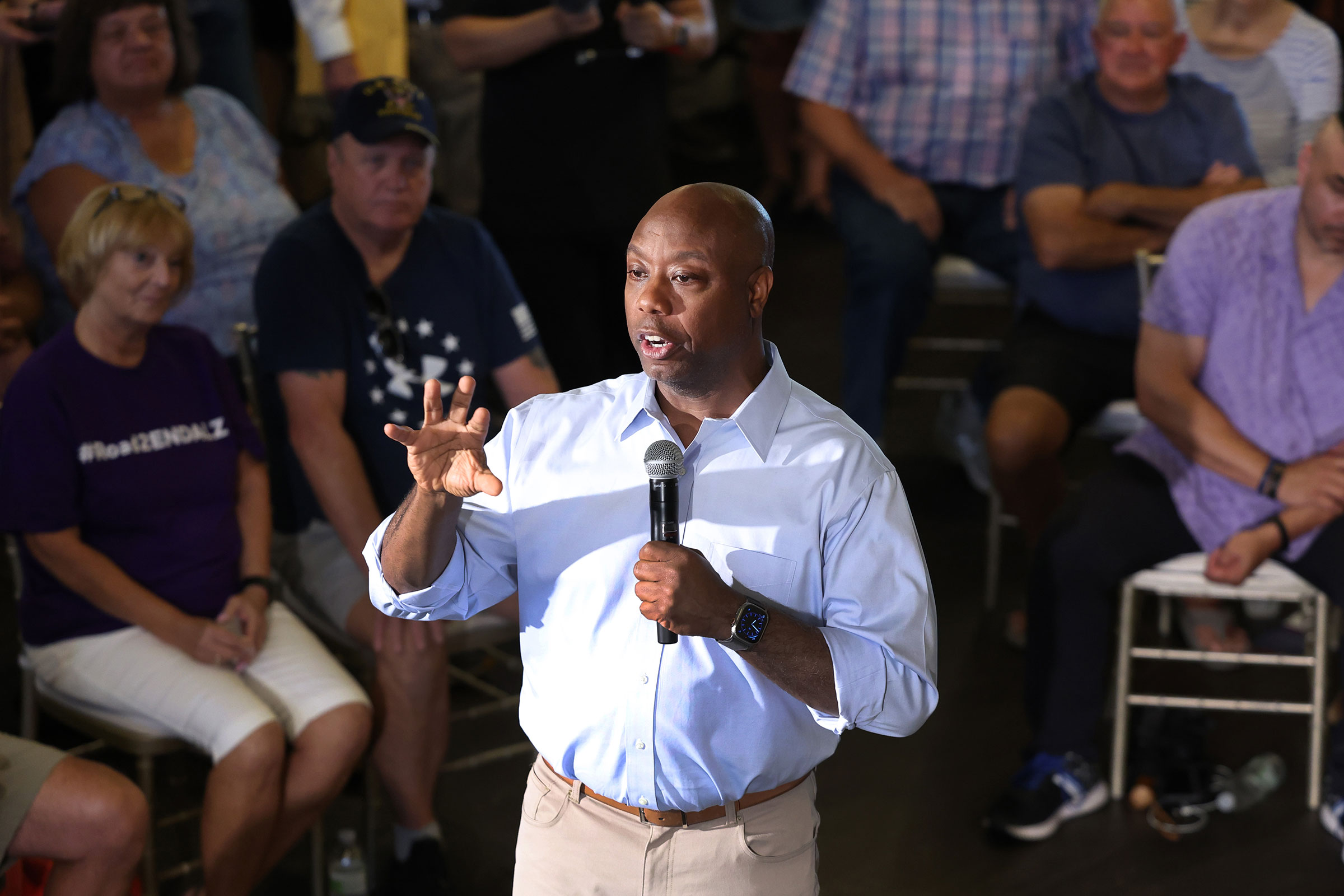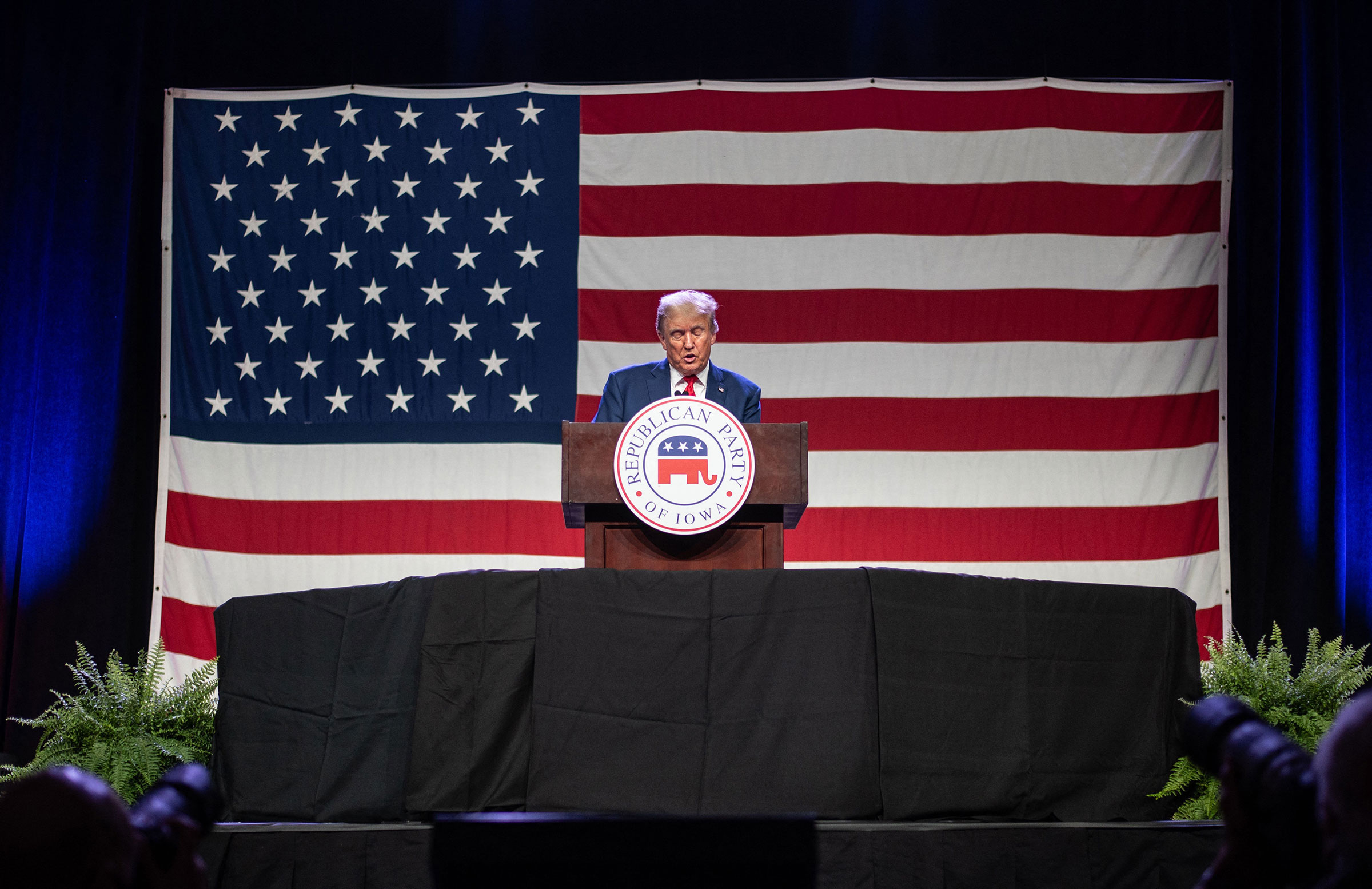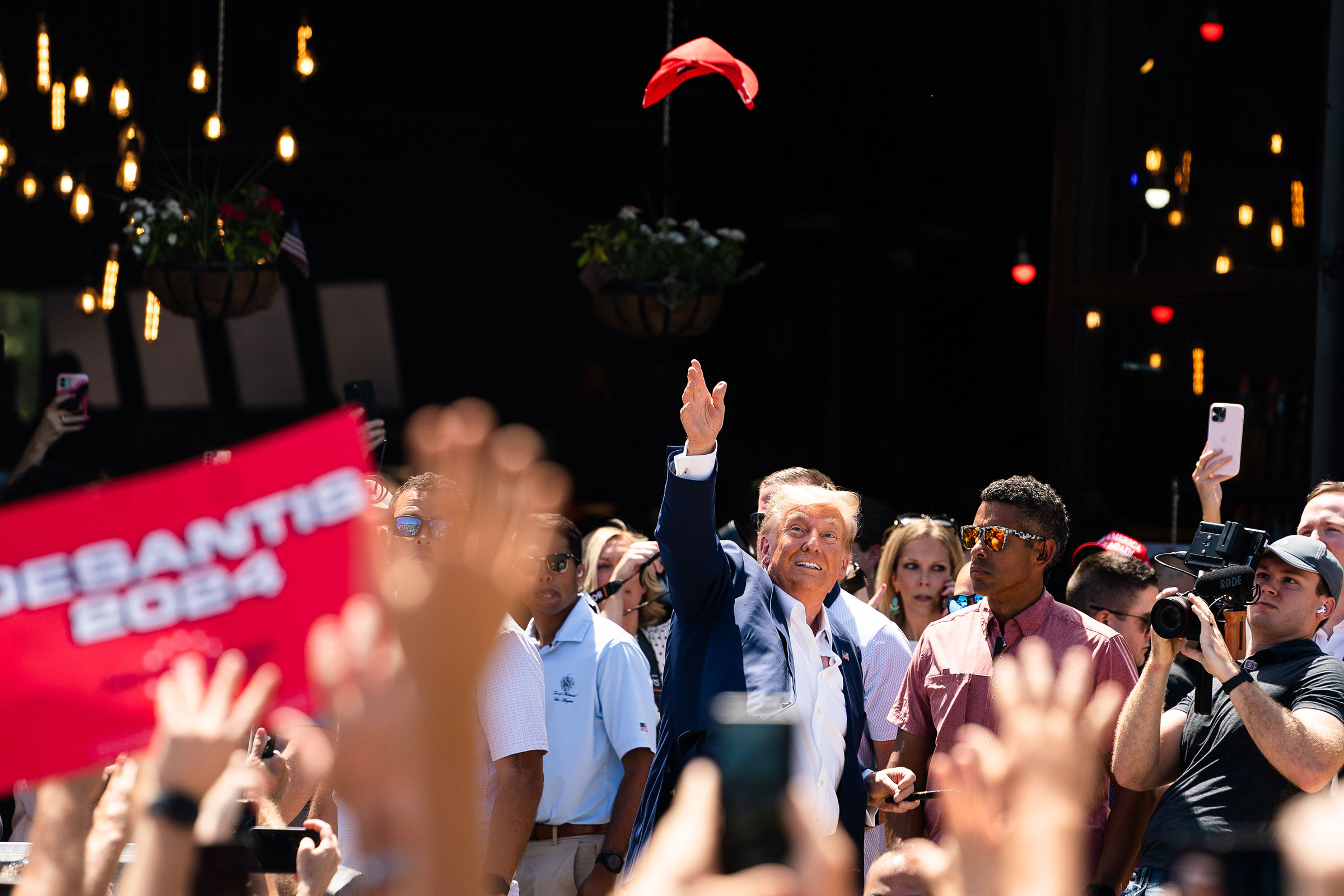The Iowa voter had a question for Ron DeSantis—a plea, of sorts, on behalf of “all the small-town people.”
Outsiders “suggest we’re the flyover country, the racists, the deplorables, the Walmart shoppers,” Jason Summers, a 53-year-old Republican activist who owns a small insurance business, tells the governor of Florida. Presidential candidates, he adds, “come around every four years, they kiss our babies, pat us on the head and send us on our way, and then they forget about us.” How could the residents of Albia, Iowa—pop. 3,712—be sure that DeSantis wouldn’t abandon them too?
Less than an hour earlier, DeSantis had roared into town juggernaut-style, disembarking from a bus emblazoned with his name and that of Never Back Down, his $100 million super PAC, trailed by a dozen advisers and security staff. DeSantis has vowed to visit all of Iowa’s 99 counties—Albia’s Monroe County would be No. 31—precisely for moments like this one, a chance to commune with voters and perhaps even to have the sort of viral moment that would loft his struggling campaign back into contention for the GOP presidential nomination. Now he stood in a former church converted to a veterans’ wellness center, surrounded by a scrum of media, cameras and microphones extended to watch him take a swing at the softball Summers lobbed up.
But given the chance to offer some hint of emotion, DeSantis proceeds to answer the question like a standardized test. First, he says the stereotypes about flyover country are “not a narrative that I’ve ever accepted.” Then he points out that while people may associate his state with “places like Miami or Palm Beach or Central Florida theme parks,” it also has “a lot of those types of communities.” They are important, DeSantis adds, in part because they produce many recruits for the military and law enforcement. “But I do think the clash of, kind of, elites on the coast is, these guys have really strong values here, and they don’t always like that,” he concludes, without a flicker of passion.
This is the man who was supposed to be the Trump Slayer. Yet as the 2024 campaign lumbers into gear, DeSantis has never looked like less of a threat to the former President’s chances of returning to office. Bloodied by a barrage of typically nasty Trump insults and millions in negative ads from Trump’s allies, his campaign has been a litany of disappointment, declining steadily in the polls since its botched Twitter launch on May 24. His culture-war message isn’t moving voters; donors fret that he’s not ready for prime time; pundits pick apart his every stilted move. The campaign has recently undergone an extended “reboot,” laying off dozens of staff and replacing the campaign manager. Many of the same conservatives who once crowned him the future of the GOP are already declaring him toast.

It is somehow both early and late in a Republican primary campaign of maximum consequence, the race that will determine whether next year’s election turns into the sequel that few Americans claim to want: Biden vs. Trump, once again. Too early, rival campaigns and many voters say, for people to start paying attention and making up their minds about a primary season half a year away. And yet it already feels too late for anyone to lay a finger on Trump, whose lead in polls stands at 30 or 40 points.
The front runner, meanwhile, has put forth the minimum imaginable effort, sleepwalking through rote speeches, jeering at federal law enforcement, visiting Iowa only a handful of times. He’s skipped campaign cattle calls, insulted the state’s popular Republican governor, and danced around the abortion issue that animates many of the religious conservatives who make up the backbone of the GOP base. With just a few days before the first Republican presidential debate on Aug. 23 in Milwaukee, he is not even planning to show up. And why should he? He is running away with this thing as rivals flounder and leap to his defense after each successive criminal indictment. Rather than condemn the actions that have now led to 91 state and federal charges, DeSantis, like most of the field, has bolstered Trump’s claims of victimization, decrying the supposed “weaponization of government” and vowing to pardon the former President if he is convicted. “I think the Department of Justice is highly political. I think that the charges in D.C. are flimsy charges,” DeSantis tells me in an interview, days before a Georgia grand jury hands down yet another Trump indictment for crimes against democracy.
Iowa’s first-in-the-nation caucuses on Jan. 15 loom as the best chance to change the race’s frozen trajectory. The state has a history of elevating long-shot, close-touch candidates, particularly those who win the hearts of religious conservatives. Many of these voters have continuing qualms about Trump, whose lead over DeSantis is slightly smaller here than it is nationally. In polls, some 70% of potential caucusgoers say they are open to a non-Trump candidate. Yet DeSantis has failed to make it the two-man race many anticipated, and no one in the rest of the field—a well-credentialed group that includes current and former governors, a sitting Senator, and Trump’s own Vice President—has risen to take his place as Trump’s chief rival.
Read More: The DeSantis Project.
And so the candidates have descended on Iowa, blitzing the airwaves with commercials, patronizing small businesses, giving speeches to local groups. The state’s Republican voters see America “at a tipping point” and want above all to find a candidate who can win the general election, the longtime Iowa GOP chairman, Jeff Kaufmann, tells me. They want to see the candidates up close and personal, to look them in the eye and hear it straight. On his recent swings through the state, DeSantis has held town halls and meet-and-greets, popped into small-town coffeehouses, and traipsed through sweaty fairgrounds. “We’ve got to run the long race, not the short race,” DeSantis’ newly installed campaign manager, James Uthmeier, tells me. “It’s back to basics, follow your gut, listen to the voters. Trump is not what’s in the eyesight, it’s the voters, the Iowans, the people that are struggling.”
DeSantis, like everyone else, wants to believe the campaign is about something else—The Issues, the current President, the price of tea in China—when it is self-evidently about one thing and one thing only, the singular, binary question that has perplexed the political system for so many years: Can Trump Be Stopped?
In Albia, DeSantis takes a few more questions from locals and the media before being hustled back onto his campaign bus, where he’ll head to the next flyover town, hit all his marks, make the intended contacts, and tick another county off the list. As the bus pulls out, I return to Jason Summers, who is chatting with the town’s mayor on the steps of the former church. I bring up his poignant remark about politicians kissing babies and then forgetting about their promises. Did he feel Trump had done that?
Summers thinks about the question. “Honestly, I think just the opposite,” he says. “One of the strange things about President Trump was that while he didn’t have that small-town politeness, he identified with the small-town issues. That hardness that Trump speaks with, they looked over because he was actually fighting for them.”
At a town hall in the Des Moines suburb of Ankeny, a man gets up to ask Tim Scott a question. Reading from a notebook, Steve Alexander, a ponytailed local in a beret and vest, informs the Senator that he has a five-pronged test for candidates that he calls the “Five P’s.” On the first three—personality, politics, and performance—Scott has passed with flying colors. “It boils down to the last two things, promises and policies,” Alexander continues. “One thing about Trump, he made promises and he kept ’em where it was possible.”
Scott, the only Black Republican in the Senate and a devout Christian, has been rising modestly in the Iowa polls as DeSantis slips. His campaign and affiliated super PAC have blanketed the state with ads touting his sunny, aspirational appeal. A conventional, rank-and-file Republican—he helped design Trump’s 2017 tax-cut bill and voted against both his impeachments, but did not object to certifying the 2020 election—Scott centers his campaign message on the idea that his life story puts the lie to liberal accusations of a racist society. “Where do I start?” he asks Alexander, grinning.
Scott talks about his record and outlines a set of proposals he would pursue on issues like taxes, school choice, and opportunity zones. He speaks with feeling about his upbringing, sprinkling in religious references and folksy sayings. At one point he describes Biden’s spending policies as “like a goose lost in a rainstorm.” A capacity crowd has packed the airy venue, and Scott’s easy banter with Governor Kim Reynolds has them laughing along.

Afterward, he takes questions from reporters, including one about a controversy DeSantis faces back home over proposed Florida educational standards that say enslaved people sometimes benefited from skills they learned in bondage. Scott manages to attack the substance while seeming magnanimous at the same time: “What slavery was really about was separating families, about mutilating humans and even raping their wives. It was just devastating. I would hope that every person in our country, and certainly running for President, would appreciate that.” But, he adds, “People have bad days. Sometimes they regret what they say.”
Longtime Iowa hands insist the race is far from over. “Anything can happen,” says David Young, a former member of Congress now serving in the Iowa state house. Mike Bousselot, a state senator representing a swing district, says Trump is a “polarizing figure” among his Republican constituents, many of whom would prefer to hear about his vision for the future rather than personal grievances. What unites them all, Bousselot says, is an intense focus on electability: “Universally, it’s ‘the next election is too important, we need to win.’”
Read More: A Guide to All of Trump's Indictments.
Anti-Trump Republicans point to precedent to make the case that Iowans will slow his momentum. In the 2016 election, Trump cannonballed into the state, ignoring all the rules. He named a former Apprentice contestant as state campaign co-chair, brought a helicopter to the Iowa State Fair, and did little of the usual retail politicking. Most experts assumed the thrice-married former Democrat would not appeal to a state partial to humble, churchgoing candidates like the previous two caucus winners, former Governor Mike Huckabee and former Senator Rick Santorum. Senator Ted Cruz courted conservative voters with a data-fueled grassroots organization, while Senator Marco Rubio appealed to business-minded moderates—a typical GOP base-establishment split.
Trump, meanwhile, built an entirely new kind of coalition. In dying former factory towns in Eastern Iowa, I remember meeting crowds of blue collar voters who’d never be caught dead at a Rubio or Cruz event. Many had never caucused or weren’t even Republicans. In the end, Cruz eked out a victory, 28% to Trump’s 24%, with Rubio a close third at 23%.


The caucus electorate hasn’t fundamentally changed since 2016, says Dave Kochel, a GOP consultant and adviser to Governor Reynolds. “All those people still exist, and they haven’t all become Trumpers, even if they’re all defenders of the tribe.” With the right pitch, Trump’s current rivals have access to both Cruz’s social conservatives and Rubio’s establishmentarians. “Iowa’s going to be really, really important, and I don’t think it’s a slam dunk for Trump,” Kochel says. “He’s winning, no doubt about it, and somebody else has to catch some breaks. There’s too many people in the field right now. The only way you’re going to beat Donald Trump is by having one strong candidate against him.”
Conservative groups who view another Trump nomination as a sure ticket to Losertown are carefully trying to pry his voters free, cognizant that reciting the former President’s litany of well-known personal failings will merely trigger his tribe’s defensive reflex. The Club for Growth’s Win It Back PAC is airing ads featuring testimonials from Iowa voters who talk about their journey away from Trump. Americans for Prosperity Action, the super PAC affiliated with billionaire Charles Koch, plans to rally its deep-pocketed donors around a non-Trump candidate and will endorse later this year, officials say. Since late June, Americans for Prosperity’s canvassers have been on the ground in the first four states to vote next year. “When we’re actually knocking on doors talking to folks, we’re finding people are open to thinking about the race more pragmatically,” Drew Klein, the group’s Iowa director, tells me.
In several days attending events across the state for numerous candidates, I met many of the voters AFP and other anti-Trump groups are targeting. They voted for Trump against Biden and Hillary Clinton, with varying degrees of enthusiasm, but now they are weary of the drama and ready for a fresher face. They like what they hear from DeSantis, Scott, and others, and they feel they have plenty of time to make up their minds over the next five months. Talking to these earnest, enthusiastic Republicans, the race can indeed feel wide open.
But when I ask them who they caucused for in 2016, these voters invariably say Cruz or Rubio, not Trump. For those trying to topple the front runner, the problem isn’t the voters who are coming out to see them. It’s the voters who aren’t.
The Lincoln Dinner is the Iowa GOP’s big fundraising event, and on a Friday night in late July, more than 1,200 Republicans take their seats at tables laid with chicken and cheesecake in the Des Moines convention center. An event like this is a chance for an underdog to make a splash: the 13 candidates on the program range from Trump and DeSantis to businessman Perry Johnson and pastor Ryan Binkley. The long-shot candidates would need a figurative lightning strike to put them into contention, yet still they won’t risk the ire of the pro-Trump crowd. Only former GOP Congressman Will Hurd dares rock the boat. “Donald Trump is not running for President to make America great again or represent the people that voted for him,” he says. “Donald Trump is running to stay out of prison.” Hurd is promptly booed off the stage.
Trump is the last to speak. He walks onstage holding a folder with the presidential seal under one arm and proceeds to read his speech in a singsong voice, barely looking up or departing from the script, with the notable exception of a couple of insults directed at “DeSanctus.” “I wouldn’t take a chance on that one,” he mutters, to laughs. When Trump finishes, before the allotted 10 minutes are up, the room erupts in a riotous standing ovation.
After the speeches, the candidates repair to “hospitality suites” along the concourse, where voters can visit with them one-on-one. It’s on the concourse that I run into Chris Sununu, the governor of New Hampshire. A popular anti-Trump Republican who decided against running for President himself, Sununu is optimistic Trump will be vanquished. As a quasi incumbent, “of course he’s going to be way ahead,” Sununu says. But, he insists, “people know he can’t win, and they’re looking for someone else.”
Read More: Exclusive: Ron DeSantis on Fatherhood, Parents' Rights and the 2024 Campaign.
The former President’s team can hardly believe how lucky they’ve been. Trump’s campaign started under the shadow of a disastrous midterm election, a dinner with a white supremacist, and a lackluster November announcement. But the revelations that Biden and Mike Pence also improperly took home classified documents, along with the ongoing legal saga involving Hunter Biden, have helped muddy the waters despite pundits’ protestations that those cases are orders of magnitude less severe than the criminal charges Trump faces in New York, Florida, Washington, and Georgia, which range from falsifying business records to conspiring to defraud the United States. And Trump’s own rivals have echoed his argument that the various prosecutions are politically motivated. “It’s a message that has a resonance with Republican voters,” Trump campaign strategist Chris LaCivita tells me. What worries the campaign most at this stage, he says, is not any other candidate or any prosecution, but complacency.

Inside the convention center, a man strums a guitar in Nikki Haley’s suite, while in DeSantis’, people are invited to chuck baseballs at pyramids of Bud Lite cans, an allusion to a recent culture-war controversy. But the only suite with a line out the door is the one where Trump stands behind a black-clothed barrier, posing for thumbs-up pictures with fans. Annette Hoover, a 75-year-old retired saleswoman from Indianola, tells me she is “Trump all the way” and has been since the beginning. “I can see what’s been going on is affecting him,” she says, looking genuinely pained. “It’s awful what they’ve been doing to him.”
Hoover enjoyed listening to all the candidates, but only one of them, to her, is a President.“He’s an a--hole, to be honest, but that’s what it takes to deal with the people he deals with,” she says. “We’ve got to get him back. We’re in a world of hurt right now.” DeSantis, she says, might make a good VP. —With reporting by Julia Zorthian
More Must-Reads from TIME
- Why Trump’s Message Worked on Latino Men
- What Trump’s Win Could Mean for Housing
- The 100 Must-Read Books of 2024
- Sleep Doctors Share the 1 Tip That’s Changed Their Lives
- Column: Let’s Bring Back Romance
- What It’s Like to Have Long COVID As a Kid
- FX’s Say Nothing Is the Must-Watch Political Thriller of 2024
- Merle Bombardieri Is Helping People Make the Baby Decision
Write to Molly Ball at molly.ball@time.com
